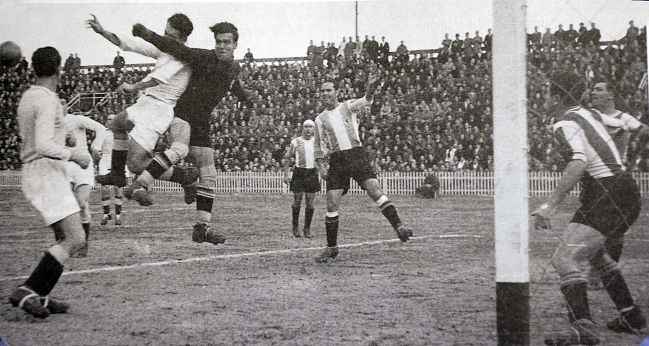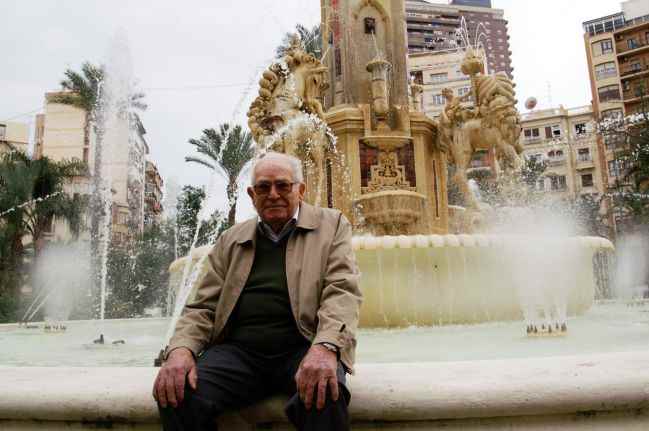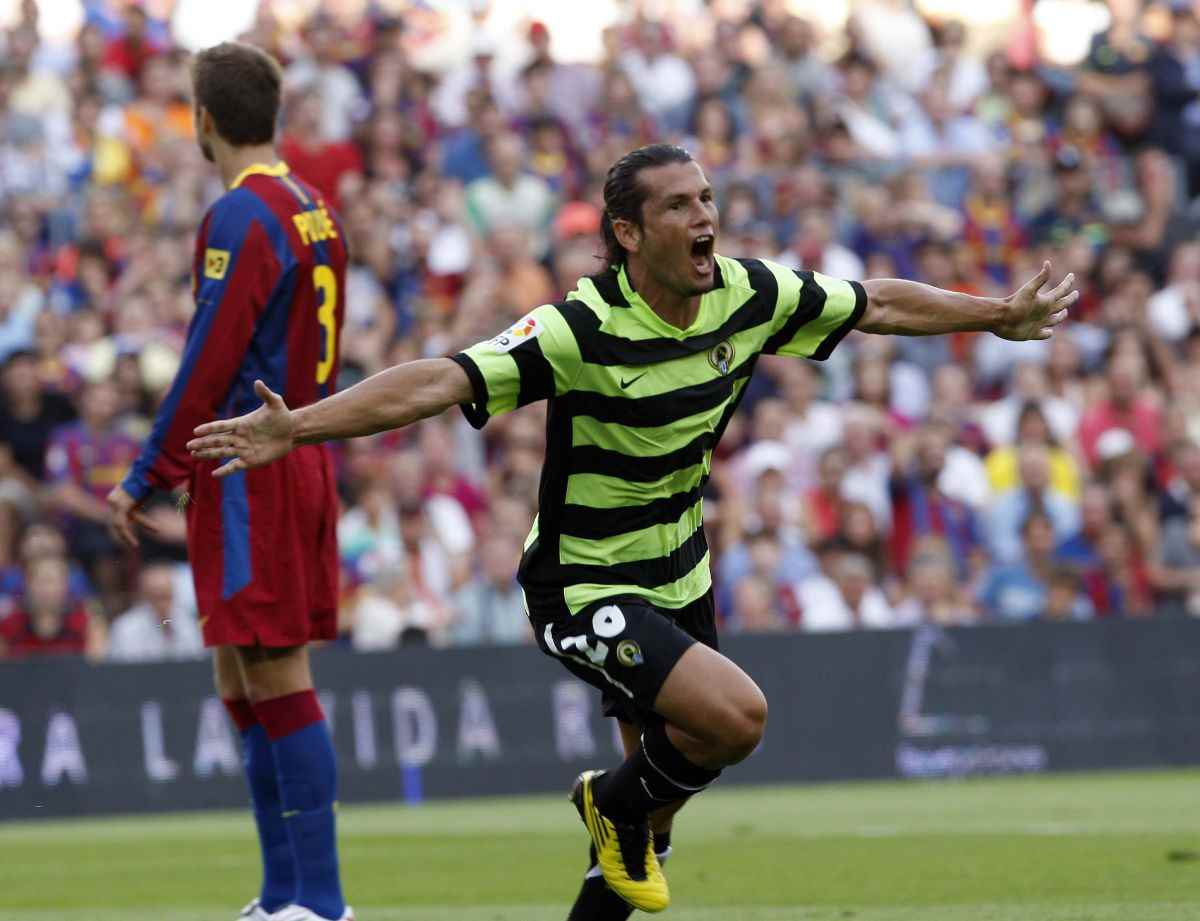By
The old Hercules becomes centenary. He cries for his fans because 100 years come at the worst moment in his history, but in Alicante he lives from the past, from memories, from those deeds that were told from parents to children. The present is depressing because Hercules is getting older in the fourth category of Spanish football, far from its natural habitat for many years. Vicente Pastor Alfosea, the ‘Chepa’, its founder, would not be proud of the sporting situation, but he would be proud of seeing how the first seed he planted 100 years ago took hold. His soccer team is still alive. “We will name it Hercules to instill respect”, commented the father of the creature in 1922. And the Hercules, for a long time, was faithful to that visionary ‘hashtag’ of the beloved Chepa.
A team in which world champions played years ago, such as Kempes, Trezeguet or great figures of the time, such as Baena, Giuliano, Humberto…
Stars in the Rico Pérez
The new generations resist losing the feeling of belonging. In the last playoff, the best thing, after the umpteenth depression and not achieving promotion, was seeing a Rico Pérez with many white and blue jerseys from recent seasons. Youngsters supporting a team in which world champions played years ago, such as Kempes, Trezeguet or great figures of the time, such as Baena, Giuliano, Humberto… Many of those who were on the field in the particular ‘Centenariazo’ against the Adarve had not even been born. But there they shouted, as their grandparents and parents did in their day. That’s the Hercules. Although the joys have been scarce for years, the illusion of seeing a big club again and feeling proud of it, is still latent. Surviving until the storm passes is the great hope of a hobby that still continues to tear their throats every Sunday in any corner of the country.

Enlarge
FOOTBALL 10/11
FITO GONZALEZ (JOURNAL AS)
It all started at the end of the 10s. Before the club was founded, ‘Chepa’ was already playing for Plaza de la Montañeta, serving as captain. From there, he began all the procedures to create the entity. The reward came on October 20, 1922, the day on which the civil governor gave the green light for the Hercules to take his first step. Back then, his colors weren’t white and blue. The Hercules wore red and white, hence the commemorative shirt of its centenary. Years later, he inherited the colors of the Swimming Club. From then on, the blue and white wore on his shirt.
The first great successes of the Hercules took almost 15 years to arrive. In 1935, the first of the eight promotions to First Division that the club has in its showcase was achieved. Blázquez, against Celta, touched the sky in Alicante, at the mythical Bardín. That was the first home of the Hercules. In the ‘Bombonera’, as the stadium was known, Hercules began to be the talk of the whole country. Years later, the field of La Viña and José Rico Pérez arrived, the other two houses that Hércules has had in its 100-year history.
For decades, the Hercules was an elevator club. The team from Alicante took a long time to consolidate in Spanish football. His surname of historic and classic First Division was earned in the 70s. Of the 21 seasons in which the club has been in the top flight, in that decade they were nine in a row. That was the golden age of Hércules, with Arsenio Iglesias on the bench and José Rico Pérez as president. The legendary leader, apart from leading the best Hercules in history, left a great legacy: the current stadium. In August 1974, the current home of the Alicante team opened against Barça. Years later, Rico Pérez saw how his work achieved glory after hosting the 1982 World Cup, held in Spain. Maradona scored his first goal with Argentina at the home of Hércules.
Hercules, in 74-75, came to caress their participation in Europe after finishing fifth in the League, in their best historical classification. Arsenio’s team was left without a place in UEFA due to goal difference with Real Sociedad. That did not deprive Hercules of making a name for himself, of being respected and of collecting great players. At that time, Rico Pérez was a boiler. There was not room for a soul in the cement. Those are the most repeated legends that are told from generation to generation in recent years. Those who lived through those years affirm that facing the Hercules was like going to the dentist.
“Hercules is a sleeping giant that will have to wake up. Arsenio was the example to follow for many of us. What that team achieved was something incredible. Being in the First Division for so many years in a row made him have a name,” says Quique Hernández, the coach who has directed the Hercules more times in its history. The survivors of those years vibrated with scenes like that of Humberto leaving a playing field on his knees after achieving a promotion. That, so earthly, made thousands of herculanos feel proud of his team.

Enlarge
MATIAS SEGARRA (JOURNAL AS)
After losing the category in the 81-82 season, the Hercules was never the same again. Although he returned to First on several occasions, his position in the highest category disappeared. In fact, his last two appearances for the elite were fleeting. The fans had to settle for sporadic feats, the kind that occurred from time to time and very occasionally. Although more than one, left a notch in the centenary.
Before collapsing completely, one of the conquests that give luster to the history of Hércules was that of Sanabria’s goal at the Santiago Bernabéu. A bit that was worth a permanence in the First Division and that had an entire city waiting for the radio, although there were also many who populated the stands of the white sanctuary. For many, that triumph, unexpected and when many saw the Hercules in Second Division, has been one of the most important in these 100 years of history.

CARLOS LOOKS (AS DAILY)
For today’s forties, Hercules is the team that rose with authority in Las Palmas, with Quique Hernández on the bench. Also that project that walked through Second with Manolo Jiménez until achieving promotion, with Alfaro, Rodríguez, Paquito or Pavlicic as stars. Nor can we forget the comeback at the Camp Nou and that goal by Rodríguez to turn Ronaldo, Figo and company’s Barça upside down. Then came the promotion in Irún and the ‘Valdezazo’ at the Camp Nou, the last great night of Hércules in a substantive scenario. The double of the Paraguayan Nelson Valdez is part of the recent history of herculanismo. Only twelve years have passed since that feat, although it seems like an eternity.
The last few years, until celebrating the Centenary, have been marked by the presence of Enrique Ortiz in the Alicante entity. The businessman from Alicante has been at the helm of the club for 23 years. His stage has been sad and depressive, although he pulled Hercules out of the well with that promotion in Alcalá and returned him to First Division after conquering Irun. Ortiz has been the club’s economic lifeline for the past two decades, but not the person capable of keeping Hercules on top. Of the 23 years that the businessman has been, the club has spent 15 seasons in the catacombs of Spanish football.
The current Hercules turns 100 years old at the worst moment in his history. That makes him celebrate a bitter anniversary. The team is in the Second RFEF and does not even rule in the category. He is eight points behind the leader and out of the playoffs. “It hurts us all to see Hércules in this situation and that it reaches its centenary at this time. But we must abstract from everything for a few dates because this is very important. The club is still alive and it is time to honor and commemorate all those who left their lives and money for this centennial entity”, many legends of the club have added in recent months when they have been questioned about the current situation.
Alicante cries helplessly because the giant has been asleep for many years, but for a few hours this Thursday he will put on his tails again to congratulate the city team, the one that spent 21 years in the First Division, caressed Europe and concentrated great players. Alicante will also proudly tug on the ears of old Hercules because he arrives alive and because he yearns for much better times.
Navarrese: Although he only spent four seasons at Hércules, for many he was the best winger who defended the blue and white shirt. The man from Orihuela had to give up football due to a heart problem. He had no roof.
Macia: 197 games contemplate him. And that in the 30s and 40s are many. The Santapolero was a pioneer, one of the best left-handed central defenders who have played for Hércules. He joined the Republican side in the Civil War.
Jose Perez: The Canarian is on the list for being a great goalkeeper and for becoming the only absolute international who went to the National Team as a blue and white player. He was blue and white during two different stages.
Guiliano: The Argentine marked an era in the Hercules. He arrived very young and soon became the head of the defense. He played 245 matches with Hércules, of which 209 were in the top flight. A rocky, hard defender, from before. Rico Pérez adored him.
Babe: Mythical central of the best Hercules in history. The man from Ceuta arrived in Alicante in 1971 and did not leave the Hercules until he placed it at the top. He was promoted to Primera and later was one of the pillars of Arsenio’s team. The center-back was the one who defended the blue and white shirt the most times in its history, with 362 games. He passed away in 2012.
Saccardi: For many, ‘Cacho was one of the best midfielders in Blue and White history. Saccardi did not leave anyone indifferent, due to the capacity in which he covered the field and his temperament.
Kustodic: The Montenegrin striker was also part of Hercules’ golden age. An intense striker with a lot of character, one of those who infected the stands. His celebrations on the stadium fence will never be forgotten.
Paquito: One of the mythical captains and the third player with the most games (342). A Herculaneum on all four sides who also achieved a promotion as sports director to First. Escudero won the hearts of the fans for his quality and charisma. He defended the blue and white shirt in First, Second and Second B. An idol in the 90s.
Rodriguez: The top scorer in the history of Hercules, with 86 goals. A total ‘killer’ who touched the sky at the Camp Nou with an epic comeback. Before, he left for the memory the 39 goals he scored in the 1992-93 season.
Tote: Idol of the new generations, like Peña or Farinós. But the man from Madrid deserves to be in the ranking for his quality. For many, the best ’10’ they have seen step on the Rico Pérez. He was injured at his best moment, in the First Division. People still idolize him.
